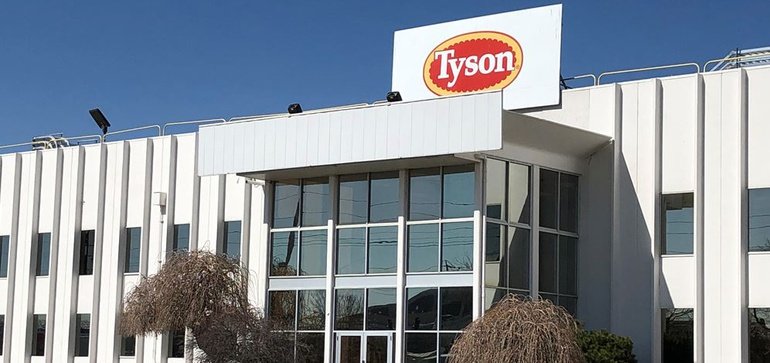Tyson pledges to achieve net-zero emissions by 2050

Dive Brief:
- Tyson has announced plans to reach net-zero greenhouse gas (GHG) emissions throughout its supply chain by 2050. The meat producer claims it is the first U.S.-based protein company to receive approval for it its GHG reduction plan from the Science Based Targets initiative (SBTi), which helps the private sector create environmental targets to address climate change.
- Some of the initial steps it is taking to achieve this goal include creating a plan to use 50% renewable energy throughout its U.S. operations by 2030, sourcing 100% of its feed from sustainably grown sources by 2030, promoting sustainable cattle management on five million acres by 2025 and eliminating deforestation in its global supply chain by 2030.
- Tyson is one of several major corporations, including Nestlé and competitor JBS, setting targeted environmentally friendly goals as sustainability-marketed products continue to drive growth in the industry.
Dive Insight:
As one of the largest protein producers in the world, Tyson’s pledge to not only reduce its emissions but reach net-zero status signals just how important sustainability has become to consumers. The meat industry has come under increasing fire recently as a major emitter of GHGs. As the global population expands, increasing meat production to meet the world’s growing protein needs would lead to increased emissions, deforestation, soil degradation, water stress, and more, according to a report from IDTechEx.
Encompassing all three scopes of the SBTis is a lofty goal because it requires Tyson to examine the carbon footprint of not only its internal operations but its entire supply chain as well. To achieve net zero status, Tyson will need to investigate nearly every step in its operations to identify ways to shave off emissions. This has the added effect of placing pressure on its supply chain players to clean up their emissions in an effort to keep doing business with Tyson.
“At Tyson Foods, we believe progress requires accountability and transparency and we are proud to exemplify that as we work to achieve net-zero greenhouse gas emissions by 2050,” said John R. Tyson, the company’s chief sustainability officer, in a statement announcing the pledge.
Tyson also released its 2020 sustainability progress report, which highlights some of its existing efforts. It recently switched to sustainable packaging material across its Jimmy Dean brand and launched zero waste to landfill pilot project at three of its facilities, which diverted over five million pounds of waste from landfills. This represents a 60% increase from 2019’s landfill diversion program, according to Tyson. In January 2019, it also joined forces with the Environmental Defense Fund to pilot climate-focused agriculture technologies on 500,000 acres of corn.
In addition, it’s making a serious push to expand its plant-based protein options through its Raised & Rooted line, which now includes faux hamburger patties, ground, bratwursts and Italian sausages. It also added two breakfast sandwiches to its Jimmy Dean brand that feature plant-based patties. With the alternative protein market projected to capture 11% of total protein sales of 2035, Tyson and other meat producers have a strong financial incentive to expand plant-based offerings.
The meat industry at large has been taking steps to address its environmental impact. The North American Meat Institute, which represents 95% of red meat producers and 70% of turkey products, recently agreed to make the industry’s environmental impact a noncompetitive issue among its members. It has also encouraged companies to share best sustainability practices.
Tyson is not alone in its effort to tackle supply chain emissions. JBS also recently committed to achieving net-zero status by 2040, 10 years earlier than Tyson. JBS-owned Pilgrim’s Pride announced a $1 billion sustainability-linked bond tied to its target of reducing emissions by 30% by 2030. The interest rate will increase 25 basis points if a third-party auditor concludes that JBS failed to meet its targets.
Source: fooddive.com

